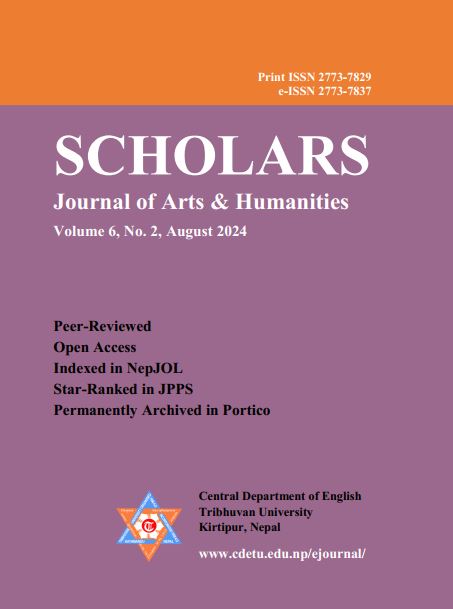Eco-consciousness through the Dialectics of Hope and Hopelessness in Cormac McCarthy’s The Road
DOI:
https://doi.org/10.3126/sjah.v6i2.68742Keywords:
Environmental apocalypse, dialectics, eco-consciousness, dystopian world, biotic and abiotic worldAbstract
The dialectics of hope and hopelessness unfolds eco-consciousness in Cormac McCarthy's The Road. In the narrative, two unnamed characters embark on their journey through the devastated landscape in search of life supporting climate and safety. This paper examines how their journey oscillates between optimistic and pessimistic events. McCarthy's fiction implicitly attributes the natural disaster to human misdeeds. Going after material achievements and material greed, human beings are paying less attention towards ecological issues. They are interfering the course of nature and violating the web of interdependence of the biotic and abiotic world. Consequently, it has invited different types of apocalypses pushing the ecosphere in danger. This paper claims that the display of the dystopian world is purposeful for the author for making human beings serious towards ecological issues. To create awareness against such misdeeds, the novel gives a sense of imminent environmental peril. At the same time, the novel presents different events and situations that signal hope with a strand of positive possibility. This dialectical presentation of hope and hopelessness that creates eco-consciousness is the issue this paper has explored in the novel. Applying qualitative research design, this study critically examines and analyzes both dystopian and hopes generating events and situations in the novel. Lawrence Buell's critical insights on environmental apocalypse serve as a theoretical perspective for textual analysis of the primary text.
Downloads
Downloads
Published
How to Cite
Issue
Section
License

This work is licensed under a Creative Commons Attribution 4.0 International License.
© Central Department of English, Tribhuvan University and Authors




